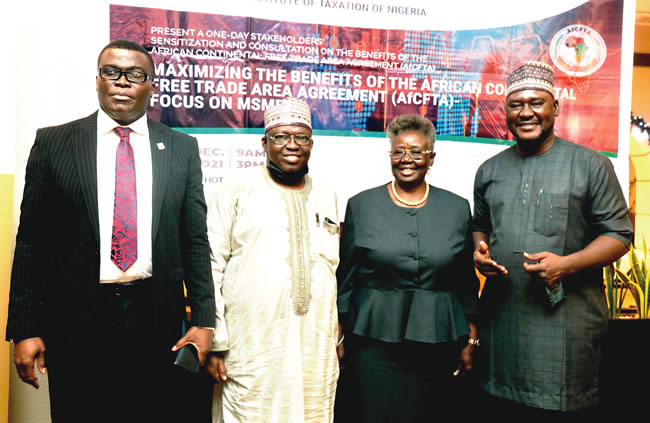One of the major aims of the African Continental Free Trade Area (AfCFTA) is to increase the continent’s intra-continental trade by 52.3 per cent by 2022. This provides an opportunity for Small and Medium Enterprises (SMEs) to flourish by leveraging Africa’s huge market. But economic and financial experts at a stakeholders’ meeting convoked recently in Lagos by the Civil Society Legislative Advocacy Centre (CISLAC) and OXFAM Nigeria in collaboration with the Chartered Institute of Taxation of Nigeria (CITN), submitted that for the country to really benefit from AfCFTA, the government has to up its game. Sulaimon Olanrewaju reports.
The focus of African Continental Free Trade Area (AfCFTA) is the elimination of tariff and non-tariff barriers among member countries through the provision of a single market for goods and services with a view to deepening the economic integration of the continent as well as the prosperity of its people. While the inherent benefits in the project are incontrovertible, what is also incontestable is that the benefits accruable to a country are hinged on its level of preparation for the intervention.
The engine room of the AfCFTA is the Micro, Small and Medium Enterprises (MSMEs) because they are responsible for the production of the bulk of the goods moved across the continent. Due to their ubiquity, MSMEs are important contributors to value creation, employment generation and trade expansion.
According to the National Bureau of Statistics (NBS) and the Small and Medium Enterprises Development Agency of Nigeria (SMEDAN), SMEs in Nigeria account for about 96 per cent of registered Nigerian businesses, employ quite a sizeable number of the nation’s workforce and contribute immensely to the country’s Gross Domestic Product (GDP).
Many people are of the opinion that given the huge size of the nation’s MSMEs, the creativity and versatility of Nigerians coupled with the country’s huge population, Nigeria is positioned to harvest huge benefits from its membership of AfCFTA. However, some others are concerned that many Nigerian companies may not be able to take advantage of the agreement or cope with the influx of new competitors from other countries within the free trade area because of internal inefficiencies within businesses and suboptimal business environments.
To brainstorm on how to tackle the likely challenges that may hinder Nigerian businesses from reaping the accruable benefits of the country’s membership of converting the continent to a free trade zone, the Civil Society Legislative Advocacy Center (CISLAC), OXFAM Nigeria and the Chartered Institute of Taxation Nigeria (CITN) organised a stakeholders’ forum themed ‘Maximising the Benefits of the African Continental Free Trade Area Agreement’ in Lagos recently to sensitise Nigerian government and businesses on how to position the country and its enterprises to take advantage of AfCFTA.
The forum had in attendance experts from Civil Society Organisations (CSOs), academic community, corporate organisations and the media.
While delivering the opening remarks, Auwal Musa Rafsanjani, Executive Director of CISLAC, said the impact of the AfCFTA cannot be determined by government policies alone but also by how much the private sector leverages the abundant opportunities available in the free trade area.
In that regard, he said the government needs to embark on continuous sensitisation to ensure that the people come to understand the message of AfCFTA and see the benefits derivable from it.
His words, “In Africa, despite sensitisation and consultation campaigns in all the geo-political zones, there is a seeming lack of mass enlightenment on the AfCFTA with only 30 groups and 2,317 neutral persons sensitised and consulted on the AfCFTA.”
Rafsanjani added that it is not enough for a country to just parade many SMEs, noting that without the right strategy, a country with a huge number of SMEs may still lose out of the benefits.
According to him, “Without an active strategy to ensure that SMEs are aware of the AfCFTA and put in a position to capitalise on the agreement, the AfCFTA’s positive impact on the Nigerian economy will remain minimal.”
Also speaking President of the Chartered Institute of Taxation of Nigeria (CITN), Adesina Adedayo, noted that the AfCFTA has the potential of contributing greatly to the movement of capital and natural persons, and facilitating investments across borders by laying the foundation for the establishment of a continental customs union at a later stage.
Adedayo said, “AfCFTA was established primarily with the objective of deepening African economic integration through a single market for goods and services and to promote industrial development through diversification and regional value chain development.
“The advantages of this agreement are quite enormous. It has the potential of contributing greatly to the movement of capital and natural persons, facilitating investments across borders by laying the foundation for the establishment of a continental customs union at a later stage.
“MSMEs remain critical constituents of the Nigerian economy as they represent 96 per cent of Nigerian businesses and contribute 75 per cent to national employment. MSMEs will benefit from access to new markets and the economic transformation that competition promotes.”
The CITN President, however, added that despite the obvious advantages of AfCFTA, it is not without its threats. According to him, the threats posed by AfCFTA could be easily addressed if the government would institute measures to protect vulnerable industries.
He added that the measures that should be introduced include, improving transport infrastructure and enforcing policies which would see a reduction in the cost of production with much consideration and easier access to credit facilities by the MSMEs, stressing that these measures “would in turn make goods export competitive and promote rapid growth in industrialization which in return boost our nation’s economy.”
In his keynote address on benefits of AfCFTA to SMEs and Nigeria, Professor Ishola Akintoye, a former financial consultant to the World Bank and Tax Commissioner at the Tax Appeal Tribunal, called on the government to get serious with its implementation of AfCFTA to avoid missing the benefits offered by the continental platform.
Akintoye, who is a Babcock University Professor, added that if the country tarried as long as it did before signing up for AfCFTA, it would be disastrous if it ended up losing out on the benefits.
Professor Akintoye stated further, “AfCFTA is simply an idea to have a single plan for all African countries to come together under an African integration developmental authority that will make all the member countries grow together.”
Speaking on the benefits, which he noted outweigh the demerits, he said AfCFTA would allow African-owned companies to enter new markets, facilitate economic growth, encourage foreign direct investments, reduce input cost, increase efficiency and sales, minimise the threats and improve its competitive advantages under the AfCFTA.
He, however, added that the government must carry out an impact assessment to determine likely effects of AfCFTA implementation on government revenue, identify required changes to existing laws and regulations including local content rules, and areas of competitive and comparative advantages.
He called on the government to build institutional capacity to lead the implementation of AfCFTA and identify key stakeholders and agencies with key responsibilities, expected outcomes and performance indicators.
According to him, the government should systematically improve the capacity of the Nigeria Customs Service to secure and enforce Nigerian borders to prevent dumping, transshipment, smuggling and other detrimental cross border activities.
He added that, as a matter of urgency, the government must address regulatory and policy impediments and promote small scale industries in local machine tool manufacturing, fishing and crop production, livestock, forestry, audio visual and financial services through extension of focused Venture Capital and skills enhancement under AfCFTA.
“The FIRS and the JTB should leverage technology and the new TIN system to improve the quality and integrity of taxpayers’ data, enhance tax intelligence gathering and initiate reforms to ensure appropriate taxation of nonresident individuals and businesses with sufficient connections to Nigeria.
“Ensure policy coordination and alignment between monetary, trade and fiscal policies. “Most importantly, conduct regular, extensive and robust scientific studies on different aspects of AfCFTA as it affects Nigeria both in terms of potential benefits and probable losses to inform policy decisions on future withdrawal, review and modifications of the AfCFTA treaty.”
Speaking in a similar vein, a former Director General of Lagos Chamber of Commerce and Industry (LCCI), Dr. Muda Yusuf, noted that countries with strong productivity and competitiveness will benefit more from AfCFTA.
According to him, “Benefits and costs would vary from country to country. Countries with a quality investment environment would emerge as key destinations for investment; countries with weak investment environments will be market destinations.”
Yusuf, however, noted that the challenges of AfCFTA include multiplicity of membership, slow ratification of protocols and reluctant implementation of agreed plans, lack of complementaries of African economies, socio-economic policy divergence, inadequate infrastructure, limited national and regional capacities, and lack of full private sector involvement at both planning and implementation stages.
At the end of deliberations, the discussants submitted that there is the need to wake up the consciousness of Nigerians, particularly those in Micro, Small and Medium Enterprises, to their respective duties to, and rights from the agreement as well as how they can leverage the opportunities engendered by AfCFTA for the benefits of the country as well as their businesses.
YOU SHOULD NOT MISS THESE HEADLINES FROM NIGERIAN TRIBUNE
Buhari Urges MTN For Quality Service, Downward Price Review In Cost Of Data, Other Services
President Muhammadu Buhari Friday at State House Abuja urged the MTN Group to make the available top-of-the-range service to its Nigerian subscribers…
We Have Not Had Water Supply In Months ― Abeokuta Residents
In spite of the huge investment in the water sector by the government and international organisations, water scarcity has grown to become a perennial nightmare for residents of Abeokuta, the Ogun State capital…






